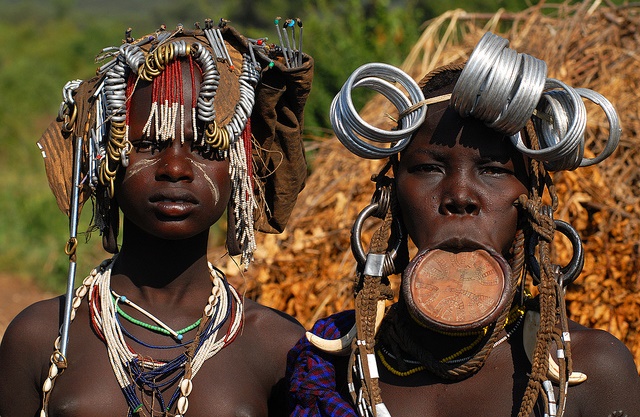Ethiopia: Fight for Land in the Lower Omo Valley
/OMO VALLEY, Ethiopia - Citizens of the Lower Omo Valley are competing with the government for their land. The government is eying the land for cash crops such as sugar and palm oil. The indigenous population consists of thirteen tribes who rely on the verdant land and rich soil for food and to graze cattle. An estimated 200,000 locals will be pressured to relocate and countless more will be affected indirectly.
The Omo River is an important tributary of southern Ethiopia. Its course is entirely contained within the boundaries of Ethiopia, and empties into Lake Turkana on the border with Kenya. (Source: Wikipedia)
There are thirteen interrelated ancient tribes that live in the valley and Kenya. The Ethiopians who inhabit this region adorn their bodies with colorful designs and often incorporate flowers and other plant life as part of their habiliment. The Daasanach, Hamar, Karo, Kwegu, Mursi, and Suri are some of the most recognizable peoples of the Omo Valley. They have successfully maintained their culture and traditions unchanged for centuries; that is until now.
Government-ordered construction of the Gilgel Gibe III Dam on the Omo River will be absolutely destroy the culture and lifestyles of these indigenous peoples. The sugarcane that the government wants to plant is both invasive and will siphon massive amounts of water to fill irrigation canals. As a result of this diversion, there will be as much as a 72-foot drop in Lake Turkana, leaving a meager 30-feet of water. Seasonal flooding, also known as "flood retreat agriculture," which has been used for centuries by farmers across the world, will all but disappear.
This type of farming relies on the annual flooding cycle to deposit a layer of nutrient-rich silt which acts as a natural fertilizer thus making the land productive. The damming of rivers have in every instance decimated the indigenous farmers living along the banks, as in the case of the Aswan Dam in Egypt which reduced the flow of the Nile Rive to such a point that farmers who remained now have to rely on man-made fertilizers.
The Gibe III Dam is sure to have the same, if not worse effect, as the people of the Omo Valley have remained unchanged and seemingly untouched by the modernization that much of Africa has undergone. Now the smaller agricultural yields of local crops, no replenishment of grazing areas and a reduced fish population will increase inter-ethnic conflicts. The cattle which some tribes amass as a sign of wealth and prestige, but which is also used for food, clothing, and to provide as dowries for brides will also be impacted. Cattle require free access to clean water and unrestricted grazing land. The inevitable government restrictions will deprive local people of food, income, and tradition.
The Ethiopian government has stated that they are not insensitive to the needs of these people and have designed a relocation plan known as "villagization." They promise government-sponsored villages complete with schools, clinics, and a viable infrastructure. However, it would require a major lifestyle shift from a pastoral-nomadic to a sedentary one. Additionally, the move would not be voluntary as it can only be achieved using subtle or overt elements of intimidation and violence.
It is legally required for the government to consult with and obtain free and informed consent from the local population before interfering with their lives, and more so when the proposed changes are going to be drastic and irrevocable. Yet to date, the Omo Valley population has neither been informed nor have they consented to the ongoing changes the Ethiopian government engages in as it prepares to build Gibe III.
Follow Sarah on Twitter Twitter: @nahmias_report Contributing Journalist: @SJJakubowski
Related articles
Ethiopia dam project could start power generation by June (worldbulletin.net)
Ethiopia dam project could start power generation by June - official (trust.org)
The people pushed out of Ethiopia's fertile farmland (bbc.co.uk)
The Omo Valley Tribes (survivalinternational.org)
Damming the Omo River Could Stop the Flow of Ethiopia’s Cultural Diversity (nationalgeographic.com)























